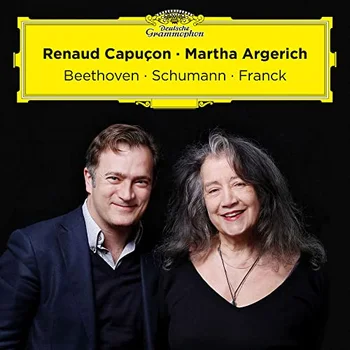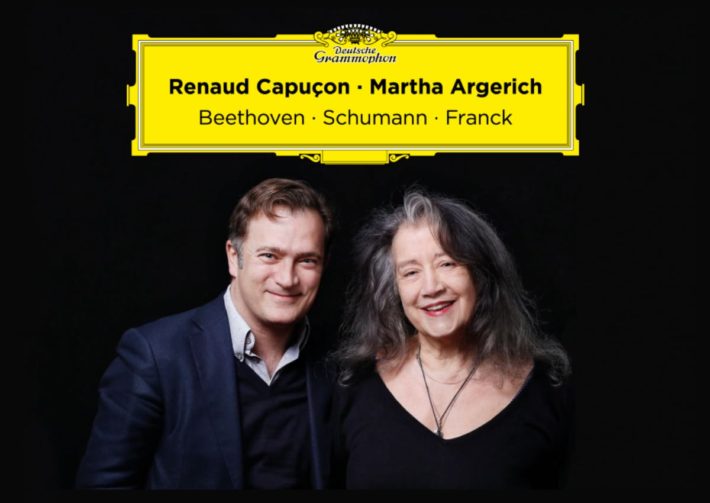To say that Martha Argerich and Reynaud Capuçon are familiar with the repertoire here is an understatement. The duo has previously performed the Schumann Op. 105 live from the 2010 Lugano Festival. Argerich recorded the complete Beethoven and Schumann violin sonatas with Gideon Kremer in the ’80s (Schumann’s first also exists in collaboration with Itzhak Perlman on Warner); Capuçon did the same with frequent collaborator Frank Braley in 2010. And as for the Franck, the pianist has accounts with Ivry Gitlis, Anne-Sophie Mutter (on video), and Itzhak Perlman, among others.

The Kreutzer Sonata shows the duo amply responsive to Beethoven‘s quintessentially abrupt changes in character and color throughout. Once we get to the first movement’s Presto section, the call-and-response type passages (1’55”) have seamless precision and synchronicity, as do the minute dynamic swells. Capuçon is instrumental in bringing out the section’s fierceness, courtesy of acerbic double stops and stinging trills. Compared to the equally worthy Argerich-Kremer recording, I noticed a heavier, almost thunderous piano presence owing to a combination of the instrument’s character, the recording balance and a touch more pedal. In general (here and on the other pieces in this album), Argerich is less tempestuous compared to her previous versions.
In the theme and variations (track 5), Capuçon charms us with the grace and fluidity of a coloratura soprano that, if you listen closely, is tinged with a sense of fragility. The way Argerich plays the piano part, we hear a complementary presence, one that provides reassurance and support via warm bass tones. That doesn’t mean, however, that she doesn’t have a few operatic moments of her own: listen for a delightful flurry of trills at 1’08”. Where comparisons are concerned, the Capuçon-Braley account reveals some interesting differences in nuance: a hint of desperation underlies the violin‘s arched lines while the piano phrases seem a bit more punctuated.
With the high bar set in the Kreutzer, I was excited to listen to the duo’s Franck. In the Allegro ben Moderato (track 7), the pianist treats the upward phrases not so much as earnest queries but more as a vehicle to create an almost Impressionistic aura: her pedaling catches just the right amount of ambient sound integral to the magical, atmospheric vibe. Although the violin’s timbre naturally lends it a more vocal quality, Capuçon builds on Argerich’s approach. The slower pacing (a bit too relaxed for my liking) paints an image of one lost in a world of thought. The arrival at E major (1’49”) marks the arrival of a much-needed forward push and the promise of more momentum. But alas, things don’t quite take off. For all the lovely and tender colors, particularly in Argerich’s playing, I was crestfallen to admit that the movement doesn’t quite come together, needing more of a forward flow on the whole.
I was hoping that the rather tame approach of the Allegro ben Moderato would mean a starker contrast to the animated Allegro (track 8). However, I was again frustrated: the performance doesn’t deliver enough furioso. The piano’s opening could use a drier pointillism from the outset. While Capuçon doesn’t fail to establish his presence, his phrases don’t have the exciting, breathless urgency I was anticipating. The more climactic parts of the movement fare a bit better but another issue arises in an occasional lack of control. (Turn to the Batiashvili/Gigashvili recording–which I reviewed a few months back–and you’ll hear how the violinist introduces greater austerity with emphatic accents and tightly contoured lines that are almost curt. Even the most passionate moments from this duo also retain a pristine clarity). The finale (track 10) brings the work full circle, hearkening back to the introspection of the first movement. Despite a bit too much rubato by the violinist here and there, the duo does a nice job intensifying and transforming the movement’s optimism into sheer jubilance at the end.
And there’s Schumann’s A minor Sonata, perhaps the least performed work here, which receives a convincing performance without sounding so hectic as on the previous Argerich/Kremer version, nor too cautious as on Argerich’s collaboration with Perlman. Capuçon and Argerich’s previous take from Lugano, though swifter and more energetic, is close in approach yet more drily recorded.
The sound engineering, taken live from Festival de Pâques d’Aix-en-Provence, succeeds in thoughtfully maintaining the relationship between the violin’s lighter sound and the piano’s thicker timbre. Capuçon’s playing always comes through but appropriate attention is given to the fine nuances, especially in Argerich’s piano dynamics.
The Beethoven certainly remains the standout on this album, but the Franck and Schumann are also worth listening to, as they show how both artists have developed and adjusted their approaches over time.
Recommended Comparisons
Kremer | Argerich | Perlman | Tetzlaff
Beethoven, Schumann, Franck – Violin Sonatas
Renaud Capuçon – Violin
Martha Argerich – Piano
Deutsche Grammophon, CD 4863917



















